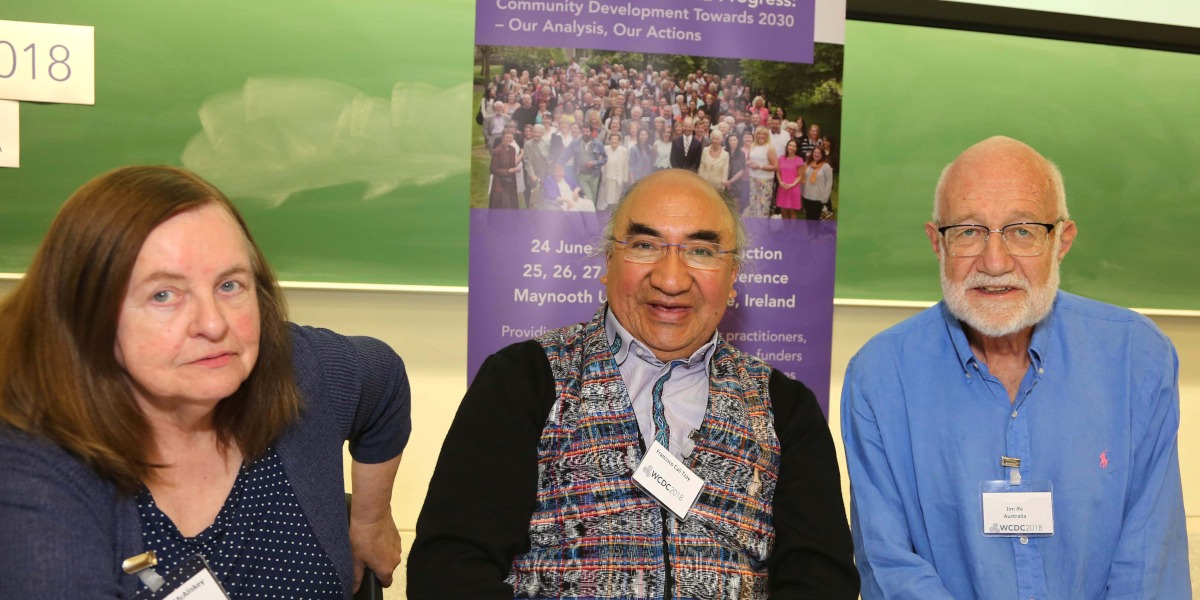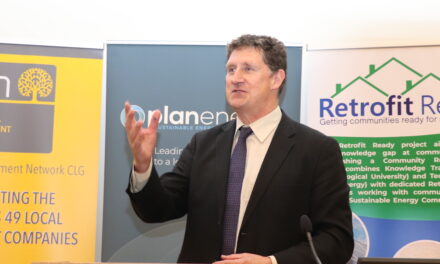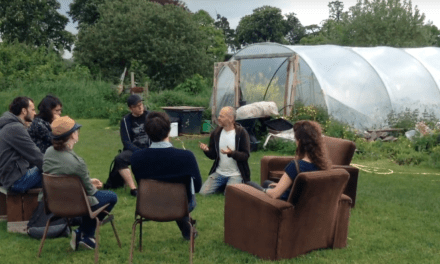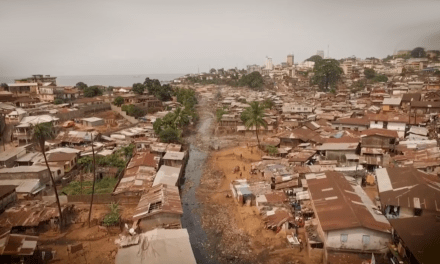At this summer’s World Community Development Conference in Maynooth, activist Jim Ife spoke about why community development workers have to stop pulling their punches.
On day two of the 2019 World Community Development Conference, attendees filed into a packed lecture hall at Maynooth University for ‘Global People and Local Conflicts: Framing Community Development for Today’s World’, a plenary session featuring Bernadette McAliskey, Francisco Cali Tzay and Jim Ife.
Ife – an Australian activist, analyst, scholar and academic – presented a thought-provoking take on humanity, human-centric ideologies and humankind’s impact on nature, issuing a clarion call of sorts: the solution to climate change, he suggested, might just lie with community development workers.
Below is the full transcript of his plenary, edited for clarity by Kirsty Tobin. (Emphasis is Ife’s.)
I’m standing here now – as a privileged, white, Western male – with a sense of shame, because it is privileged, white, Western males that have so comprehensively stuffed up the world. And it is that world that still privileges white, Western males that has given so many people a real sense of despair as we look to the future.
I know we just sang, ‘You know there’s always tomorrow,’ but the state of the world and the state of the environment are such that, today, many people are doubting there’s always tomorrow. And they’re doubting what I saw on the banner outside the grounds of [Maynooth University] saying, ‘Your future knows no bounds’. Well, for many people today, their futures do know very serious bounds.
And it is with that sense of shame, as I said, that I come to this presentation really arguing that it’s time that the privileged, white, Western male view of the world was set aside to allow other voices, other narratives, other wisdoms to take over.
In the context of the Anthropocene, the notion of the Holocene that lasted for the last 10,000 to 12,000 years was a very stable period. It allowed human settlement. It allowed this thing we call civilisation to develop, because the environment was so stable.
Human activity has now had such an impact that we’ve entered a new geological period, which has been called the Anthropocene, because human activity has actually affected the earth physically in such a way that the certainties of the Holocene are gone – the climate’s changing dramatically, other things are changing very quickly and it’s a product of human activity.
For some, the Anthropocene is a cause for celebration. This is yet another triumph of human achievement and ingenuity; of our conquest of nature. And we hear this language, of the constant conquest of nature. We can manage the planet, we can do geo-engineering. It’s the great fulfilment of the human dream.
Others, however, will react with horror at what we have done and will seek somehow a less anthropocentric way – a less human-centred, human-privileged way – to live in harmony with the rest of nature before it’s too late.
There are critics of the idea of the Anthropocene, saying that it’s not just the result of human activity. Human activity has been around for a long time. It’s the result of particular forms of human activity by dominant groups who have chosen to ignore the limits of the planet that we live on and who do not understand the intrinsic value of the natural world.
There have been a number of writers who have suggested we should call it a Capitalocene, not the Anthropocene, because it is capitalism, pure and simple, that has led to the destruction of the world. The tradition of man having dominion over the rest of the world, able to exploit it for his profit, points to the importance of patriarchy and of monotheistic religions, in the way that religions would set up understanding that man is at the peak of creation and could dominate the rest of it for our own benefit.
Capitalism, endless growth, human hubris and an ideology of greed have got us where we are, and it’s a dead end.
People have blamed enlightenment humanism [and] the European enlightenment – centring the human as the centre of everything and seeing the rest of the world as resources to be used up and spat out as necessary – that have been imposed on the world through colonisation, and the problem of human privilege; of human exceptionalism.
There are people who are looking for the new paradigms; looking at the way that capitalism, endless growth, human hubris and an ideology of greed have got us where we are, and it’s a dead end.
What pretty well all the writers in this area agree on is that, if there is a way forward, it will require strong communities; that communities are essential. People like Naomi Klein talking about climate change, people like Raj Patel talking about economic crisis, many others… All come back to the importance of grassroots communities, community action, community activism.
As we look at our national leaders on climate change, we despair. But if we look at what’s happening at community level, there are some amazing things that people are doing despite the inaction of their governments.
This to me puts community development front and centre of where we need it for the future, and it seems to me that community development has never been more important than it is now. But it does need to lose some of its anthropocentric functions thinking about community as only consisting of humans and never mind anything else.
We have to rethink our ideas of community, development, participation, human rights and social justice. They’ve all been very anthropocentric – human-centric – and we have to understand humans as embedded in non-human communities. If it wasn’t for non-human communities and our interdependence with other species, we would not survive 24 hours.
People talk about the vanishing bees, and how we depend on them as insects, thank you very much. If we don’t realise, pretty quickly, that we have mutual interdependence with bees, we’re in serious trouble.
We can see the beginnings of this reawakening: the interest in animal rights in many parts of the world; the rights of mother earth as articulated by indigenous people, saying mother earth has rights that we have to respect, [and that] nature is more than just the recreation that it’s been sustaining; being in awe of nature, rather than conquering nature.
When I look at Uluru in Australia, that great monolith – to Aboriginal people, it’s been sacred and something at the centre of sacredness and spirituality – white men came along and immediately wanted to climb it; wanted to get on top of it, wanted to dominate it, to say ‘it’s ours’. It’s a totally different way.
When we look at the history of mountains, it’s very interesting. Mountains tended to be held in awe and respect until the Europeans came along and saw there was something to be climbed – Everest, for example. It’s the Westerners who really wanted to get on top of things, and dominate, and show that we’re better, we’re on top, we conquer nature.
What arrogance. What incredible arrogance.
The realisation of these things does give us some grounds for hope. I used to think that one of the differences between human rights and the rights of nature was that we can’t expect nature to articulate rights and demand rights in the ways that humans can. Then I realised that if we had only listened to Aboriginal people, to indigenous people, they would tell us, ‘Yes, nature does demand its rights. It’s just that we’ve forgotten how to listen’. Learning how to listen again is really important.
We have ecological community work – community development that’s about rivers and mountains and the earth and so on. There are some really exciting things happening in many parts of the world that are saying we can’t understand human community properly unless we really ground it in the natural world and become part of it.
We’re putting so much energy into trying to preserve what’s left of what we value that we’re fighting a defensive war.
But – the but – it’s all very nice to talk about things like that, but this green work can be seen as a bourgeois escape. Isn’t it a lovely, nice middle-class thing to do to get concerned about those things I was just talking about when we’ve got Trump and Brexit and all the rest of them.
[Despite that], the need for immediate activism is as strong as ever and maybe more so. We’ve forced ourselves into a position almost where progressives, including community workers, have become conservatives because we’re putting so much energy into trying to preserve what’s left of what we value – the remains of the welfare state, submersion of rights, submersion of justice – that we’re fighting a defensive war. That turns us into conservatives.
We’ve been trapped into not articulating the alternative vision. Because many of the issues that we fight about are really important, but they’re also distractions. We have to remember that the .1% – the masters of the universe – they’re really happy for us to be putting a lot of effort into things like marriage equality because, you know, it’s actually allowing them to get away with what they’re continuing to get away with: corporate greed, unchecked growth, environmental destruction… it could go unchallenged while we are put in a position of having to fight these important battles. I’m not saying they’re not important. They’re very important. But they can be a way that is used by corporate power to keep our eyes off what they’ve done.
It’s a real challenge, I think, for community workers. We have to take a long-term view as well as engaging with the immediate challenges. We have to develop and articulate alternative visions, not just react all the time. We do have to react, but we have to do more.
Community development will be central to a transition to a saner world.
How do we develop an activism and developmental approach that includes both? I want to outline what I think are five important lines of community development:
1. Stand against capitalism, at least in its current turbo-charged, neo-liberal, globalised form, destroying communities, destroying the economy, and destroying the earth. We need to stand strong against it and point out its utter destructiveness. We have to assert the value of the commons, of public spaces and of public services – not just to protect what we’ve got, but as a vision of what we want, of where we want to be, of where we want to go. And it means alliances with the various groups that are opposing capitalism and its consequences, [such as] labour, housing, public health and so on.
2. We have to strengthen our alliances with the environmental movement, partly because that’s something that a lot of people are getting excited about and motivated about. Young people who are concerned about the future will mobilise around environmental issues, and the environmental and social justice movements have to be together, because we are on about the same thing.
If we look at the so-called four pillars of green politics [below], which are pretty universal around green parties around the world, we community workers know a lot about the second and the fourth in particular. We know more about the second and the fourth, indeed, than many of the people in the green movement.
My experience when I was involved in green politics in Australia was that many people in the environmental movement were looking to people like us for help with the social and economic justice and participatory democracy parts of the manifesto.
People like community workers have really important roles to play in the environmental movement – community is so important that it leads transitions.
3. We have to deconstruct human privilege. We’ve always had a strong social justice-human rights perspective. We know that we have to have it, because if we don’t have that, [well] the Hitler Youth was a wonderful community development organisation. It ticked all the boxes – all the KPIs. Yep, involved young people, gave them a sense of belonging, engagement with the government… We have to have a social justice framework, a human rights framework of some kind, and humanism has been at the centre of our social justice rhetoric.
We’re very good at deconstructing class privilege, male privilege, white privilege, heteronormative privilege, ableist privilege, and so on. We also have to take a bit more of a look at human privilege and the way in which we have defined humans as so superior to the rest of the earth that we can use the rest of the earth for our own needs.
We like to kid ourselves that we’re more intelligent than any other species. That’s only because we define intelligence in human terms, so of course we are. If we start to read some of the fascinating literature around biology, around plants, around animals, we realise how – on their own terms – they are very intelligent in their capacity to understand their environment, react to the environment, learn from the environment, interact with the environment. And if you look at the things that humans are doing, like war and climate change and all the rest of it, we’re not all that intelligent after all.
Those sorts of ideas are very important for us in trying to decentre human privilege. We can’t altogether, because we are humans – we will always see the world in human terms – but we can at least ask some of those questions and try and think about what it means to be interdependent with the rest of the natural world, rather than using it as resources.
We know that relational reality is important, that it’s out of relationships that we see reality emerging – not out of our individual isolations – and that’s really important. We depend on the non-human world. We’re in community with it. I would die almost immediately if it were not for the millions of different microbes that are living inside my gut and on my skin. They’re not me, they’re separate organisms. They depend on me and I depend on them. We depend on the world in many ways.
4. We have to incorporate and validate indigenous and non-Western world views. The Anthropocene has to be seen as ecological colonialism. We need to side with post-colonial struggles. We need to resist epistemic colonialism. That is the colonisation of the mind, the colonisation of what knowledge means, of how we get knowledge, of how we understand the world. We’ve done that in a very white, Western way.
Indigenous people have far more eco-centric world views, realising that the lands owns us, not that we own the land. Owning land – what an arrogant, arrogant thing to even think of, and yet it became a social norm.
The natural world is inherently spiritual, rather than that Western notion of spirituality that makes people very anthropocentric. Spirituality is about the individual, about people who have a connection with this amazing, wonderful, natural world that we are systematically destroying.
Increasingly, conversations about the Anthropocene are seeing indigenous wisdom – First Nations wisdom – as being essential if we’re to have some sort of transition to a somewhat saner kind of world. So, it’s not just about siding with post-colonial struggles, it’s about accepting epistemic colonialism and doing something about that. The importance of cultural stories – art, music, dance, and so on… Well, I don’t need to say that to a community development audience.
5. The importance of matriarchal value. The Anthropocene has been patriarchal: domination, control, management of nature. I hate the term environmental management. What an arrogant thing to say – that we can manage the environment.
A transition to a more eco-centric society requires that we establish those matriarchal values as dominant: caring, nurturing, sharing, cooperation, supporting the community – these values that have been traditionally associated with women, and women’s ways of working.
Those values are essential to community development. It’s what we live. It’s what we work with. Which is why so many good community workers are women and, let’s face it, it’s women who do grassroots community particularly well.
So, this is not liberal feminism. This is not saying that women should do lots of patriarchal things. I don’t want to encourage women to join the army. I don’t want to encourage anyone to join the army. Let’s marginalise and exoticise the patriarchal and privilege the matriarchal. Have a think about what that means.
Community development, both as practice and a way of thinking, I believe, will be central to a transition to a saner world.
It’s also interestingly a time when the physical sciences, the social sciences and the humanities are starting to come together. We see in biology, for example, a real interest in cooperation, symbiosis, interdependence; about how we stop studying organisms in stranded isolation. The ways in which the physical sciences, the social sciences and the humanities, instead of being apart from each other, now need each other, and I think community development needs all of those, and it needs literacy in all of those.
Finally, the writing about post-human suggests a major ontological shift in what it means to be human. What does post-human community development look like? Community development that doesn’t stand for this [idea] of autonomous, isolated, individual humans as the centre of everything? In other words, that very wonderful understanding of what community work needs: being stretched, being changed, being challenged in threatening and exciting ways.
Four pillars of Green Politics
The Australian Greens list the four pillars of Green Politics as follows:
Ecological sustainability
Not treating our most precious resources like a giant business in liquidation – ‘everything must go’.
Grassroots participatory democracy
Real progress comes when enough people believe it is possible to make a difference and decide to do something about it.
Peace and non-violence
Trying to prevent or counter violence with violence itself will not work.
Social justice
Many of the social problems we have today could be dramatically improved if we focus of eliminating extreme inequality.
An excerpt of this Plenary session was published in Issue 61 of Changing Ireland. This full transcript has been edited in places for clarity.





